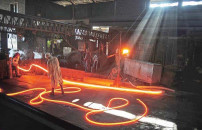Client, their prosperity big motivators for microfinance bank
Khushhali Bank looks forward to continuing to positively impact clients’ lives, their communities

Realising the growing need to cater to financing requirements of underserved individuals and small businesses at micro levels, the first microfinance bank was established in Pakistan in 2000 and since then it has improved the lives of hundreds of thousands of people nationwide.
Khushhali Microfinance Bank Limited (KMBL) President and CEO Aameer Karachiwalla, in an interview, told The Express Tribune that microfinance banks in Pakistan are primarily focused on providing financial services to individuals and small businesses.
They “cater to people with low-income levels, who do not have access to traditional banking services within agriculture, livestock and micro and small enterprises’ sectors with special focus on women entrepreneurs and low-income households.”
He emphasised that partnerships are crucial in this regard, especially during tough times. They are building partnerships with local NGOs, government agencies, and investors to access new markets, funding sources, and technical assistance.
“These partnerships have enabled us to serve the underserved communities and expand our operations,” he said.
The CEO elaborated that microfinance banks require a more personalised and community-oriented approach, which involves building relationships with customers, understanding their unique needs and circumstances, and offering customised financial solutions to meet those needs.
Additionally, microfinance institutions like KMBL “typically operate on smaller scales, with lower transaction volumes and smaller loan sizes, which require a different cost structure and risk management strategy.”
KMBL was the first microfinance bank established in Pakistan in 2000. It is managing one of the largest client bases amongst microfinance banks, with well over 700,000 active borrowers and over 3.1 million active savers.
“Our clients and their prosperity are the biggest motivators for Khushhali Bank, and we look forward to continuing to positively impact their lives and their communities.”
UBL is a founding shareholder and investor in Khushhali Microfinance Bank. It increased the shareholding to 30% in 2012, while the remaining 70% stake rests with foreign investors.
To provide financial services in remote and underdeveloped areas, the microfinance bank is using various channels such as its retail network, mobile banking, agent banking, and community-based approaches.
Providing financial services in such areas, however, pose unique challenges, including inadequate infrastructure, low levels of financial literacy, security concerns, and the lack of collaterals. “Inadequate infrastructure such as lack of roads, electricity, and internet connectivity makes it difficult for microfinance banks to provide services, and low levels of financial literacy among clients pose challenges of understanding financial products and services.
“Security concerns can also affect the operation of microfinance banks, and the lack of collateral can make it challenging for clients to access loans.”
Karachiwalla said that the Prime Minister’s Kissan Package, which provides interest-free loans to farmers who were hit by last year’s floods, is an initiative that KMBL is particularly proud of. This package is subsidised by the State Bank of Pakistan and has been well received by clients in the adversely affected farming community.
“We have also introduced robust salaries and pensions loan facility, where low-income households can borrow from us against deposits in their salary or pension accounts,” the CEO said.
“Additionally, in partnership with reputable insurance companies in Pakistan such as Adamjee, Jubilee, and Pak Qatar, we are offering insurance or bancassurance products. These solutions enable our clients to not only invest some of their savings but also receive life protection.” The Covid-19 pandemic and subsequent floods have had a significant impact on the microfinance industry, especially on the KMBL customer base that primarily operates in the agricultural and livestock business. “The two factors have certainly affected the profitability of our bank and the overall microfinance industry.”
Karachiwalla pointed out that lockdowns and slowdown in economic activity have caused delays in loan repayments from borrowers who were already struggling due to the pandemic. As a result, the bank had to defer payments for some borrowers, in line with the State Bank’s policy. “This gave them some relief in the short term, but it has also affected their repayment behaviour.”
Despite the challenges of 2022, “we’re confident in our ability to not only recover and grow, but achieve long-term sustainability,” he said. Financial services are critical to empowering individuals and small businesses who can contribute to the country’s economic growth.
“We are committed to promoting financial inclusion by reaching out to marginalised and underserved communities such as women, rural populations, and small businesses.
“To drive economic growth in Pakistan, we focus on supporting sectors such as agriculture, livestock, and micro and small enterprises. These sectors have the potential to create significant employment opportunities and contribute to the country’s sustainable economic growth.”
Sharing success stories, Karachiwalla said that KMBL has provided loan to a woman named Farzana to help her start a home-based embroidery business. With the loan, she was able to purchase a new embroidery machine and expand her business, which has now become a source of income for her family.
“Our focus on providing financial services to women has helped to promote gender equality and empower women economically.”
The writer is a staff correspondent
Published in The Express Tribune, April 10th, 2023.
Like Business on Facebook, follow @TribuneBiz on Twitter to stay informed and join in the conversation.



















COMMENTS
Comments are moderated and generally will be posted if they are on-topic and not abusive.
For more information, please see our Comments FAQ